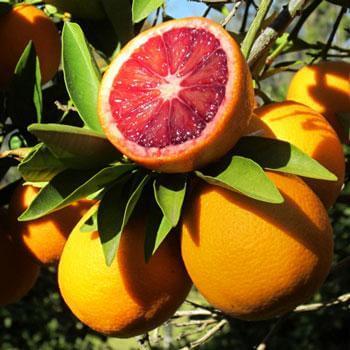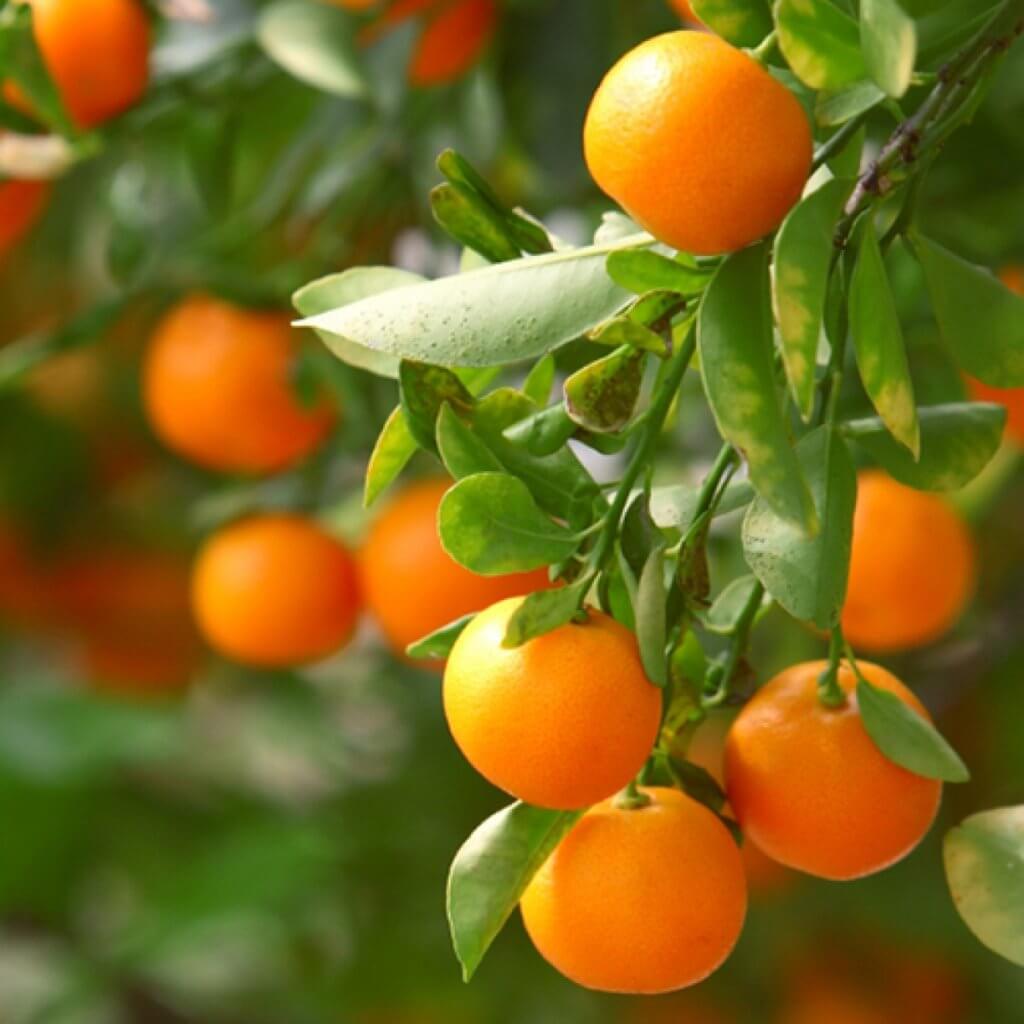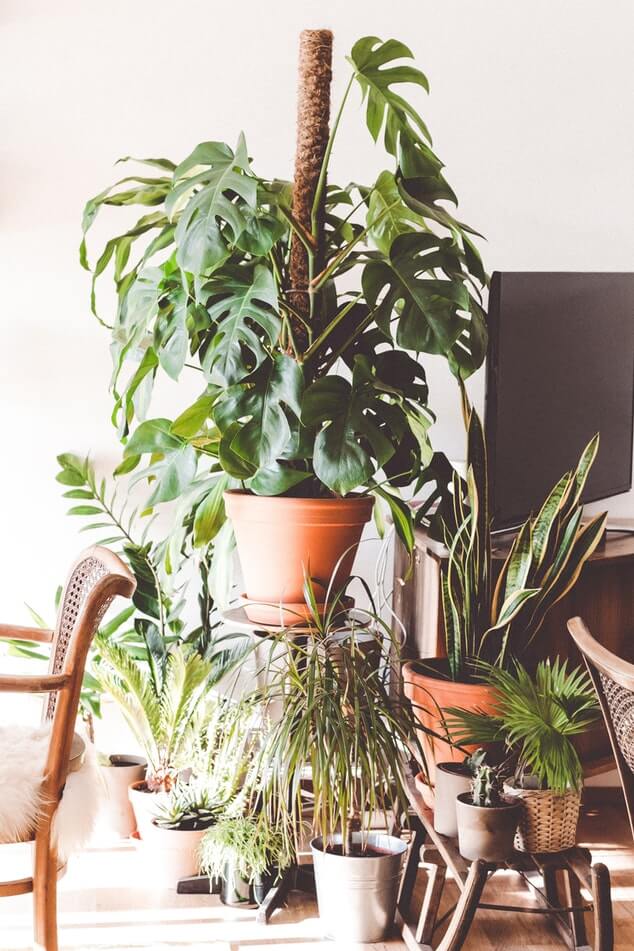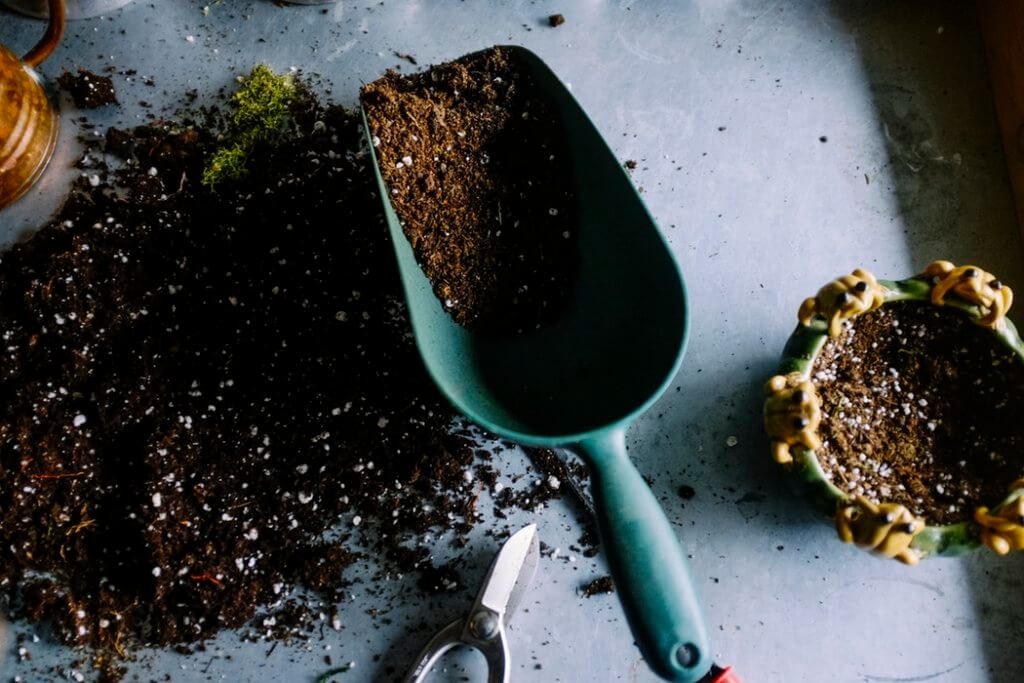Have you ever wanted to pick a fresh orange off your very own tree?
Did you think it isn’t possible because you live in the wrong climate or don’t have enough space?
I am here to tell you that you can grow orange trees no matter where you live in the world.
All you need is a pot, a few dollars to spend, and 2 minutes of care a day!
Below, are 10 EASY Tips if you want to learn How to Grow Orange Trees in Pots! These tips will make growing orange trees easy, simple, and cost-effective!
{toc}
Buy One of these 3 Orange Trees (Tip #1)
When learning how to grow orange trees in pots you must first select the correct type of orange.
If you want the quickest results at the most reasonable price then I recommend buying an orange tree, rather than starting one from seed.
Using seed to grow orange trees is too time-consuming, produces inconsistent fruit, and costs more money than buying a tree.
When purchasing an orange tree to grow in a pot, I typically only recommend three types: Mandarin (aka Satsuma), Trovita, and Washington.
Buy a Mandarin Orange Tree

Most orange trees can grow to be almost 40 feet tall and require temperatures well above 50 degrees Fahrenheit.
For gardeners in cooler weather or a lack of space this poses a problem.
Mandarin oranges solve this problem and are great when learning how to grow orange trees in pots.
Mandarin orange trees maximum height is 10 feet.
When planted in a pot you can prune and trim it to be much less. My current mandarin orange tree is only 4 feet tall and won’t get much bigger.
In addition, mandarin orange trees can survive in weather above 40 degrees and can easily be moved indoors in the winter.
Finally, mandarin orange trees typically bear fruit within the first year. I had over 20 oranges within the first 6 months!
Buy a Blood Orange Tree

Blood Orange Trees are some of my favorites when learning how to grow orange trees in pots.
Blood oranges are exotic fruits that are perfect for eating fresh or in salads. They are also a great fruit to use when baking.
Blood Orange trees produce a long harvest. They are easy to peel and the inside look like a mix between red and orange.
The maximum tree’s height is only 15 feet. Like the mandarin orange, when planted in a pot they typically only grow to 4 or 5 feet.
Although this tree can survive lower temperatures than your average orange tree, I typically recommend bringing it inside if temperatures drop below 50 degrees.
Expect blood oranges within the first 2-3 years after purchasing your tree.
Buy Clementine Orange Trees

Clementine fruit is what your average consumer eats and knows of.
Clementines are small, juicy, easy to peel oranges that are a great source of vitamin C.
But when learning how to grow orange trees in pots, these are some of the easiest!
This type of tree is very similar to mandarin orange trees. They can grow to about 10 feet tall, but much less in pots.
Clementine trees are also much more cold hardy than other orange trees can survive temperatures as low as 40 degrees.
Best of all is that they typically only take 2 to 3 years to bear fruit and when they do expect more than you can eat in one sitting!
Buy the Correct Pot (Tip #2)

Since your orange tree won’t be planted in the ground, your gardening pot is the most essential item you buy!
The reason that it is the most important item that you buy is that it is now that trees home. And if it doesn’t have proper room to grow or enough drainage holes then it can quickly stunt its growth or even die.
Not only do you want to make sure you purchase the correct pot, but also you want to purchase the correct size. This is critical when learning how to grow orange trees in pots.
I recommend purchasing a pot that is twice the size of the pot your Orange tree came in.
If your orange tree didn’t come in a pot then I recommend purchasing a pot that is twice the size of the root ball of your tree. The root ball is the bottom of the tree where all the roots come together.
Buy a Plastic Pot
Depending on what article you have read of mine, you will notice I recommend different types of pots.
Because orange trees can grow to be much larger and heavier than other trees, I typically only recommend one type of pot.
When planting your orange tree, I recommend using a Plastic Pot.
I recommend plastic pots for several reasons. While these pots may not be the prettiest, they are the most cost-effective.
They also have great drainage holes and can retain water very well. They are lightweight which is key for moving the tree in and outside. Finally, these are long-lasting and durable pots.
Buy Ceramic or Wood Pots
While I recommend using plastic pots for your orange trees, I also understand that it may not be for everyone.
If weight is not important or if you want a better-looking pot then I recommend purchasing a ceramic or wood pot.
Wooden pots are great pots if you plan on leaving your orange tree outside all year. Wooden pots are extremely durable and hold water very well. Typically, you’ll see gardeners own their wooden pots for 25 years or more!
Ceramic pots are another great pot if you want something that looks really nice. Ceramic pots are also some of the best-draining pots.
The downside of this type of pot though is that it can easily crack in cold weather. If this is a problem all you need to do is move it inside during the winter or cooler nights.
How to Plant Orange Trees in Pots (Tip #3-5)

Planting an orange tree is just as easy as planting any other tree in a pot.
One of the most important factors to remember when planting an orange tree is that it is always good to plant it in a container twice its size.
I cannot stress how important this is when learning how to grow orange trees in pots.
Orange trees quickly grow, so it will be a good idea to transplant the tree into another container that is twice the size of your first container.
You will want to do this every two to three years. You should not have to do this more than twice.
First, DO THIS! (Tip #3)
When you first get your orange tree, you will want to fill your new pot about 75% full with potting soil.
Do not use garden soil, raised bed soil, or any other side besides potting soil.
Potting soil has the perfect mix of nutrients for your orange tree. There is a chance other soils can harm and sometimes kill your orange tree.
I personally recommend Miracle-Gro Potting Mixes
For most of the orange trees you buy they will come without an existing pot.
Since there is no existing pot all you need to do is place it in the center of your new pot. And then fill it the rest of the pot with soil. I recommend not filling it any higher than where the stem meets the soil.
It should be noted that over time the soil will wash away, so you may need to add additional soil if it goes below where the roots connect to the trunk of the tree.
Next, Fertilize & Water (Tip #4)
If you want to have the most success in the quickest way then immediately after you plant your orange tree fertilize it.
There is only one fertilizer I recommend and it is: Organic Citrus Tone
After applying your fertilizer (per the instructions on the package) you will want to water it.
Initially, water your orange tree for approximately 30 seconds until the fertilizer dissolves and the soil is a dark brown.
Next, repeat this at least once a week. Typically, you won’t need to water your orange tree more than 2-3 times a week.
Your orange tree needs watering if the soil is a light brown color and dry to the touch.
Feel free to adjust how often and much you water per your own observation.
It should be noted though that if you keep your orange tree inside all year then watering once a week for 30 seconds should suffice.
Sunshine, Sunshine, Sunshine (Tip #5)
When it comes to your orange tree there is no such thing as too much shine.
If you want your tree to grow the fastest and produce the best fruit possible then make sure it receives 8-12 hours of sunlight a day.
When your orange tree is outside this should not be a problem.
If your orange tree is inside I would highly recommend putting it by a window that gets sunlight all day.
It should be noted that in the winter your orange tree obviously will not get as much sunlight as the summer. That is fine. Just make sure the orange tree continues to be in front of a window.
How to Care for Your Orange Tree (Tip #6-9)
While planting your orange tree should be relatively quick and simple, caring for it will take a little more time.
Water Properly (Tip #6)
Like most citrus trees if you want the best results you need to water it properly.
As discussed above, you will want to water your orange tree at least once a week if it is indoors and 2 to 3 times a week if it outside.
In addition, you want to water your tree in the morning or late evening. Watering at these times will help minimize evaporation and leaf burn.
Fertilize Properly (Tip #7)
Like most citrus trees that are planted in pots, it can be beneficial to continuously fertilize it over the years.
I recommend fertilizing your orange tree once a year.
When you fertilize your tree is just as important as how often.
Only fertilize your tree when there are no flowers or fruit on it.
By fertilizing your orange tree when there are no flowers or fruit all the nutrients will go directly towards the trunk and leaf growth.
Prune Away! (Tip #8)
Pruning may seem like a complex task, but I promise it is not.
Pruning your orange tree will help you better shape the tree to fit in the spot, your property, and inside your house when you move it over the winter.
Also, pruning your orange tree will promote more tree growth and this will increase the number of oranges you get.
I recommend watching the below video for more information on how to prune oranges, lemons, and other citrus trees:
Related: How to Grow Orange Trees in Pots
Repot Your Orange Tree (Tip #9)
If there is only one Tip you take advantage of it should be Tip #9 – Repot your Orange Tree.
Your orange tree will outgrow your new pot within the first year. Because of this, you will want to make sure you transplant it into another pot.
As a reminder, it is important to transplant it into a pot that is twice the size of the current pot or root ball.
Typically, I recommend repotting in the spring and doing this every two to three years. After you have had your orange tree for about 5 years you should not need to transplant it again.
Before repotting your tree make sure to water it and the soil in the new pot approximately 30 seconds. You will then need to repot it the same way as you planted it and you are all set.
Once you have transplanted your orange tree make sure to fertilize it and then water it again! Too much water is not a bad thing to help prevent root shock.
How to Harvest Oranges (Tip #10)
Once you have an orange tree fresh off your tree you’ll never want a store bought one again.
In order to have the freshest taste, you will want to pick your oranges at the right time.
If you are reading this post you most likely should know what an orange should look like.
My best suggestion is to pick your orange when it looks like the picture below.

But just because your oranges look like how do you know it is the perfect time to pick them?
The perfect time to harvest your oranges is when they look like the picture above and are just a little bit soft to the touch.
If your oranges are firm and do not give when you touch then they are not ready.
If your oranges are very soft when you touch them then you know they are overripe.
Finally, if you have a hard time removing the orange from the tree then it is too early to harvest.
Once you determine your oranges are ready to harvest all you have to do is gently grab the orange where it meets it stems and twist until it comes off!
Beware of These
By now you should have 10 great tips to growing orange trees in pots.
There are several items you want to beware of when planting and caring for your orange tree.
Cold Weather
If your forecast is calling for weather below 50 degrees fairenheit then bring your orange trees in. One of the easiest ways to kill your tree is leaving it in temperatures below 40 to 50 degrees Fahrenheit.
Too Much Water
While orange trees need a lot of water to grow and produce fruit, too much may not be good.
Overwatering can lead to root rot and other fungi that stunt growth and potentially lead to death.
Darkness
As a reminder, your orange needs about 12 hours of sunlight. If it doesn’t get 12 hours of sunlight it is not the end of the world.
If your orange tree gets less than 6 hours of sunlight a day then it will not bear fruit and potentially die.
Soil
This tip is easy. Do not use any soil besides potting soil. Wrong soil will provide incorrect nutrient, poor drainage, and an environment for disease and pests.
Weight
This is often an overlooked item when planting in pots. Don’t make your pot too heavy. When initially planting it, envision what it will look like a few years later with fruit, soil, and water.
If your pot is too heavy to move then think about placing it one spot all year or using a different type of potting mix.
Conclusion
Growing oranges in pots is an easy, cost-effective, and fun way to grow oranges.
As I talked about above there are 10 EASY Tips to follow. If you can’t follow all of the tips then I recommend these top three:
- Purchase the Correct Pot
- Purchase a mandarin, clementine, or blood orange tree
- Provide your orange tree with 12 hours of sunlight
If you follow these three tips I have no doubt you will have success. And best of all is that it will only take a few minutes every day!
If you enjoyed this article then I highly recommend reading:
How to Grow Lemon Trees in Pots (18 PROVEN Tips)

